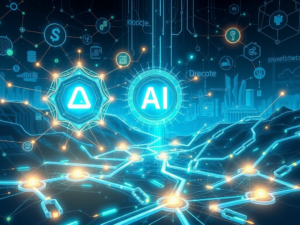Artificial Intelligence (AI) and blockchain are two of the most transformative technologies of the modern era. While AI enhances automation, decision-making, and predictive analytics, blockchain ensures transparency, security, and decentralization. The integration of AI with blockchain is unlocking new possibilities across industries, from fraud detection to decentralized autonomous organizations (DAOs).
AI-Powered Smart Contracts
Smart contracts are self-executing agreements stored on a blockchain, but they often require optimization to function efficiently. AI enhances smart contract management by continuously monitoring transactions, detecting anomalies, and predicting potential failures before execution. AI-driven automation ensures that contracts are executed under optimal conditions, reducing errors and improving security.
Additionally, AI can facilitate adaptive smart contracts, which adjust their terms based on real-time data. For example, an AI-powered insurance contract could dynamically modify coverage based on weather conditions or risk assessments, ensuring fair and efficient execution. This capability enhances the flexibility and usability of blockchain-based agreements.
Fraud Detection and Security Enhancements
Blockchain is inherently secure, but it is not immune to cyber threats. AI strengthens fraud detection by analyzing transaction patterns in real-time, identifying suspicious activities, and preventing unauthorized access. AI-powered fraud prevention systems use deep learning algorithms to detect anomalies, ensuring that blockchain networks remain resilient against cyberattacks.
Furthermore, AI can enhance biometric authentication for blockchain transactions, integrating facial recognition, fingerprint scanning, and behavioral analysis to verify identities. This multi-layered security approach significantly reduces the risk of unauthorized access and identity fraud in decentralized systems.

Decentralized AI Models and DAOs
Decentralized Autonomous Organizations (DAOs) rely on blockchain for governance, but AI can enhance their efficiency by automating decision-making processes. AI-driven DAOs can analyze voting patterns, optimize resource allocation, and execute governance protocols without human intervention. This integration improves transparency and reduces operational inefficiencies.
AI can also facilitate predictive governance, where machine learning models analyze historical voting trends and propose optimal governance strategies. This approach ensures that DAOs operate efficiently while maintaining democratic principles within decentralized ecosystems.
AI in Supply Chain and Tokenization
AI and blockchain are revolutionizing supply chain management by enabling real-time tracking and fraud prevention. AI-driven analytics optimize logistics, while blockchain ensures data integrity and traceability. Additionally, AI facilitates asset tokenization, allowing fractional ownership of real-world assets such as real estate and commodities.
For instance, AI-powered predictive maintenance can analyze sensor data from supply chain assets, identifying potential failures before they occur. This proactive approach minimizes downtime and enhances operational efficiency, making blockchain-based supply chains more resilient.
Predictive Analytics and Market Forecasting
AI’s ability to analyze vast amounts of blockchain data enables predictive analytics for financial markets. AI-driven models forecast trends, optimize trading strategies, and provide insights into market behavior. This integration enhances investment decision-making and reduces risks associated with volatile crypto markets.
Moreover, AI can improve sentiment analysis in blockchain-based financial markets, evaluating social media trends, news articles, and investor sentiment to predict market movements. This capability empowers traders with real-time insights, enabling more informed investment strategies.
Regulatory Compliance and Auditing
AI-powered compliance solutions monitor blockchain transactions to ensure adherence to regulations. AI detects fraudulent activities, verifies identities, and automates auditing processes. This synergy between AI and blockchain strengthens financial security and regulatory oversight, making decentralized systems more trustworthy.
One of AI’s key contributions to blockchain compliance is automated identity verification. AI-driven systems can cross-check user credentials against regulatory databases, reducing the risk of fraudulent transactions. Additionally, AI enhances anti-money laundering (AML) protocols by detecting unusual transaction patterns that may indicate illicit activities. This proactive approach strengthens financial security and helps blockchain platforms maintain regulatory integrity.
AI also plays a crucial role in smart contract auditing. By continuously scanning smart contracts for vulnerabilities, AI can identify potential security flaws before they are exploited. This ensures that decentralized applications (dApps) remain secure and compliant with industry standards. As blockchain adoption grows, AI-driven auditing tools will become essential for maintaining trust and transparency in decentralized ecosystems.





